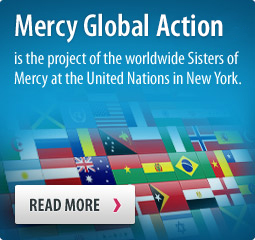
Responding to the Needs of Refugee Children and Young People Conference
Reports: July 11, 2017
'Responding to the Needs of Refugee Children and Young People Conference' was the title of a conference held on World Refugee Day (June 20th) at University College (UCD), Dublin.
 Hosted by the Irish Refugee Council and the UCD School of Social Policy and Social Work, the conference explored approaches to meeting the needs of children, both unaccompanied and accompanied, who are in the protection process. The conference was attended by social workers, legal practitioners, members of NGOs and advocacy groups, researchers and academics from all across the island of Ireland. Betty Lacey attended the conference on behalf of MIA Global Action.
Hosted by the Irish Refugee Council and the UCD School of Social Policy and Social Work, the conference explored approaches to meeting the needs of children, both unaccompanied and accompanied, who are in the protection process. The conference was attended by social workers, legal practitioners, members of NGOs and advocacy groups, researchers and academics from all across the island of Ireland. Betty Lacey attended the conference on behalf of MIA Global Action.
The opening address was given by Teresa Blake, Senior Counsel and member of the Irish Human Rights and Equality Commission who spoke about her recent experiences of working with refugee children on the island of Lesbos in Greece.
Teresa began with an overview of the legislation covering rights of asylum, which she emphasised, are not just political, but economic, social and humanitarian. She spoke of her recent trip to Lesbos where she travelled as part of the European Asylum Support Office (EASO). Based at Camp Moira in Lesbos, the group went to inform and educate refugees on their legal rights and how best to achieve them. She said that the main role of EASO is to assist the EU relocation process, in particular the provision of information on how to relocate and how to detect possible document fraud.
EASO staff has already provided information on relocation to approximately 10,500 persons and is expected to scale up its operation in Greece in the coming weeks through the further deployment of experts. Teresa spoke of life on Lesbos and commended the efforts being made by the Greek authorities and stakeholders on the ground, in handling the large flow of refugees arriving daily.
She described the humanitarian response of the Greek people as “remarkable” in how they have responded to the crisis, notwithstanding the current poverty and inequality experienced in Greece. Camp Moria’s inhabitants are mostly young adult men, but there has been no anti-social behaviour and an air of positivity and hopefulness prevails. She puts this down to the amazing fortitude, independence and resilience of the refugees. She finished by saying that “you must stand in solidarity with people in their hour of need” and referenced the visit of Pope Francis to the island in 2016, and how it inspired all who lived and worked there.
Teresa’s input was followed by presentations from Professor Ravi Kohli (10pps; PDF) of the University of Befordshire and Dr Ala Sirriyeh of Keele University. Ravi Kohli is a professor of child welfare and is interested in what happens to young people who seek asylum in richer countries, especially unaccompanied children. A migrant and a qualified social worker, he gave a passionate talk on the life of an unaccompanied refugee. He spoke about the three dimensions of Safety, Belonging and Success and said that these dimensions are not a linear reality. Safety, for example comprises legal, practical and psychological aspects but this dimension does not work alone. It is intermingled with a sense of Belonging, both formal and social. This ebb and flow also works in tandem with Success which is determined by aspects of success such as house and home, education, money and status. Dr Ala Sirriyeh spoke on the fostering of unaccompanied asylum-seeking young people and described the role of fostering as a “coming together of strangers”.
The next section was hosted by Tanya Ward, CEO of the Children’s Rights Alliance in Dublin and Aoife Dare, a youth worker with the Irish Refugee Council. This section focused on Direct Provision (DP) and we were introduced to three young people who have been living in DP for many years. Samantha, Ruth and Idris began their session with a quiz on facts and figures on the DP system. They spoke about issues they faced such as education, food, lack of privacy and mental health to mention but a few. They did workshops in Dublin, Cork and Killarney and were surprised at how many people knew so little about their lives and struggles. They also mentioned specific issues of sexual harassment where they felt they were being targetd by older men who knew of their financial plight and were seeking to take advantage of their situation. Samantha, Ruth and Idris were an inspiration and made the point very succinctly that all they wanted was an ordinary life. They finished with a reminder, lest we forget, that half of all refugees are children!
The rest of the conference focused on education and the immediate problems associated with it. Teachers spoke of language barriers and how the children are seldom familiar with the schoolroom environment, nor do they understand it. It is a very slow process. A member of the audience told the story of a young African refugee who travelled unaccompanied from Africa, across the Mediterranean, through Europe to Calais where he was turned back and sent back to Africa. He made the journey again, this time successfully and now lives in the west of Ireland. He asked his teacher a number of weeks ago if she would accompany him to Starbucks to buy a coffee, as he did not know how!
Dr. Muireann Ní Raghallaigh, Lecturer in Social Work at UCD finished the conference with these words. “An increasing number of individuals and organisations have the privilege of working with refugee children and young people in various fields including education, law, and social care. In order to work towards best practice it is essential to have their voices and lived experiences heard. This plays a central and active role in informing policies that directly affect their lives, rights and wellbeing.”
Presentation: Dr Ciara Smyth University College Cork (PPT)
Presentation: Dr Deidre Horgan, NUIG (PPT)
Messages to: Betty Lacey - Researcher Mercy Global Action




